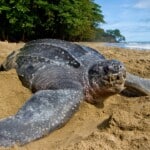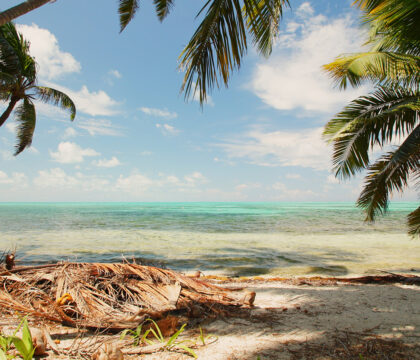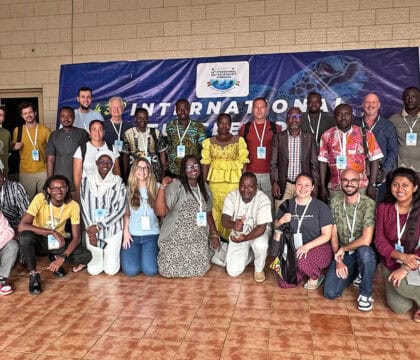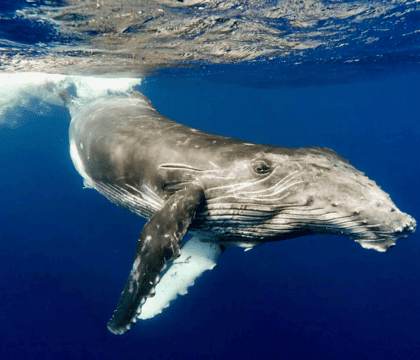February 14, 2025 • Travel Ideas
Heidi Friedlander’s 50th birthday was on the horizon. She and her husband, Josh, watched as their three children graduated college and stepped into adulthood. For a tight-knit family that had a catalog of memories exploring the world together, this transition brought a bittersweet realization—life was changing.
“Having young adult children kind of just reminds you of, you know, just how precious that time is and how families change…” Heidi reflected. Their two sons, Zach and Andrew, were both in serious relationships. Their youngest daughter, Sarah, moved to South Korea to teach. “They were all young adults establishing their careers,” explained Heidi.
While scanning Oceanic Society’s trip catalog, she dreamed of bringing the family back together for another adventure. The Coral Triangle, a highly biodiverse region sprawling across Southeast Asia and Oceania, had long been on Heidi’s bucket list. As she read about Borneo, an island within the Coral Triangle renowned for its wildlife—from orangutans in towering rainforests to sea turtles on flourishing coral reefs—she believed she had found the perfect destination. But scheduling, especially for group travel, is a common hurdle.
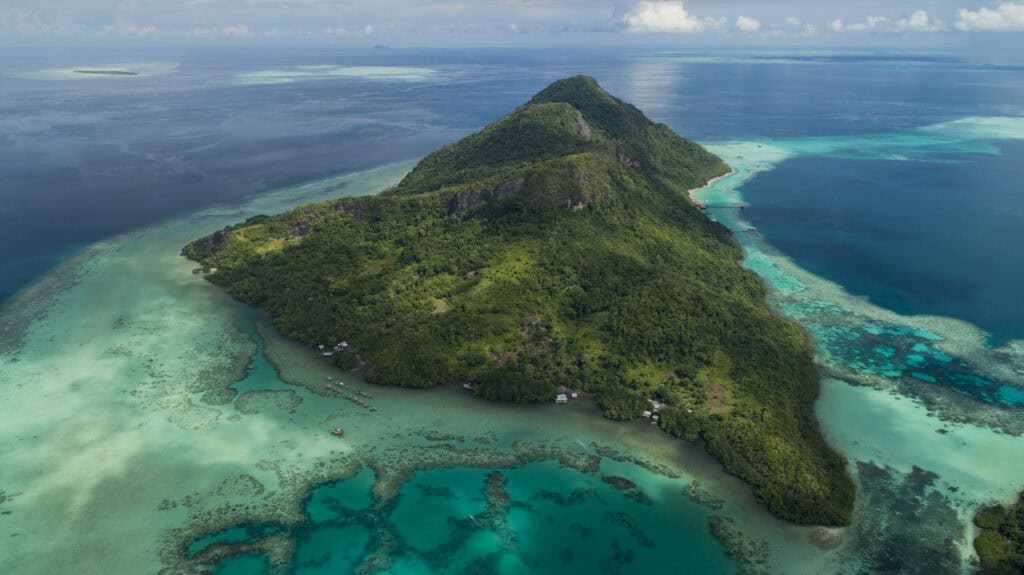
Borneo and its surrounding islands lie in the heart of the Coral Triangle and boast abundant eco-adventure opportunities. © Charles Ryan
“It had to be, like, epic enough, to make it worth them using their vacation time on a family adventure,” Heidi laughed. That began the planning process for a private family tour with Oceanic Society: “Wayne [Oceanic Society’s director of conservation travel] and I spent probably a couple of months just kind of going back and forth, dreaming about what’s possible.”
For a family that loves nature travel, Borneo, the third largest island in the world (shared by Indonesia, Brunei, and Malaysia), was easily enticing. “I didn’t move abroad in order to come back to the U.S. for every break that I have!” Sarah joked. “It started out just going to be me and my parents, and then my brothers were like: ‘Well, that’s too epic to miss.’”
Coordinating schedules is one challenge, but aligning interests while planning group travel is another. Josh, originally from New York, works in investment banking and admitted he is “a little bit of a workaholic” and isn’t much of a beach person. Meanwhile, Heidi is a self-proclaimed snorkeling enthusiast whose favorite days are “times I’ve been in the water.”
Borneo, with a fusion of land-based and marine adventures, had an activity for everyone, which is always a top priority when planning private family tours.
And once they got there, it didn’t take long for Josh to come around on the snorkeling. “You’re living ‘Finding Nemo’, okay?” said Josh, “This isn’t snorkeling. This is: You’re in a Disney movie.”
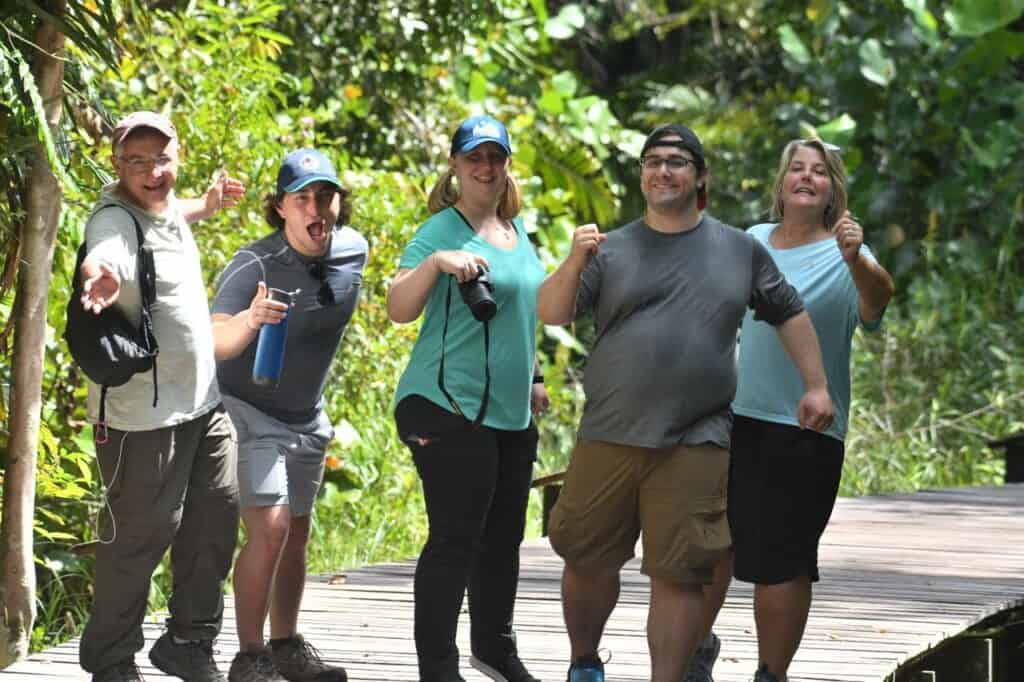
The Friedlanders: Josh (far left), Andrew (left), Sarah (center), Zach (right), and Heidi (far right). © Sarah Friedlander
Building Connections with People and Nature in Borneo
Their adventure took them to Borneo’s Danum Valley, a legendary 130-million-year-old rainforest that is home to an astonishing variety of wildlife including orangutans, clouded leopards, pygmy elephants, and even the rare and endangered Sumatran rhinoceros. Safari enthusiasts often flock to Africa’s Serengeti for top wildlife experiences, but Borneo may be one of the ecotourism world’s best-kept secrets.
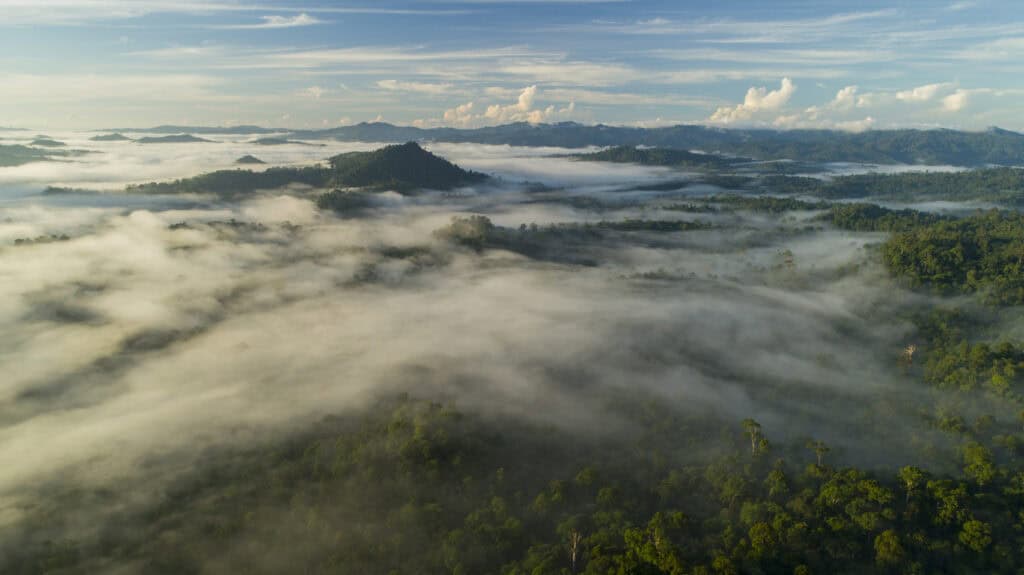
The ancient Danum Valley is famous for its orangutans and towering dipterocarp forests. © Charles Ryan
“We had just gotten to the first hotel,” recalled Josh, “And Atteh was like ‘C’mon c’mon c’mon!” Atteh (Razis Nasri), an Oceanic Society naturalist based in Borneo, rushed the family outside. “There were orangutans and orangutan babies, literally, in the trees right above us,” said Josh.
Orangutans, who live much of their lives in the towering trees of dipterocarp forests (which grow beyond 250 feet), are a special sight for visitors to Borneo. Not all travelers are lucky enough to see orangutans in the wild (which is why Oceanic Society also suggests trips to nearby sanctuaries), but the profound moment struck the family with an immediate sense of connection to the natural world.
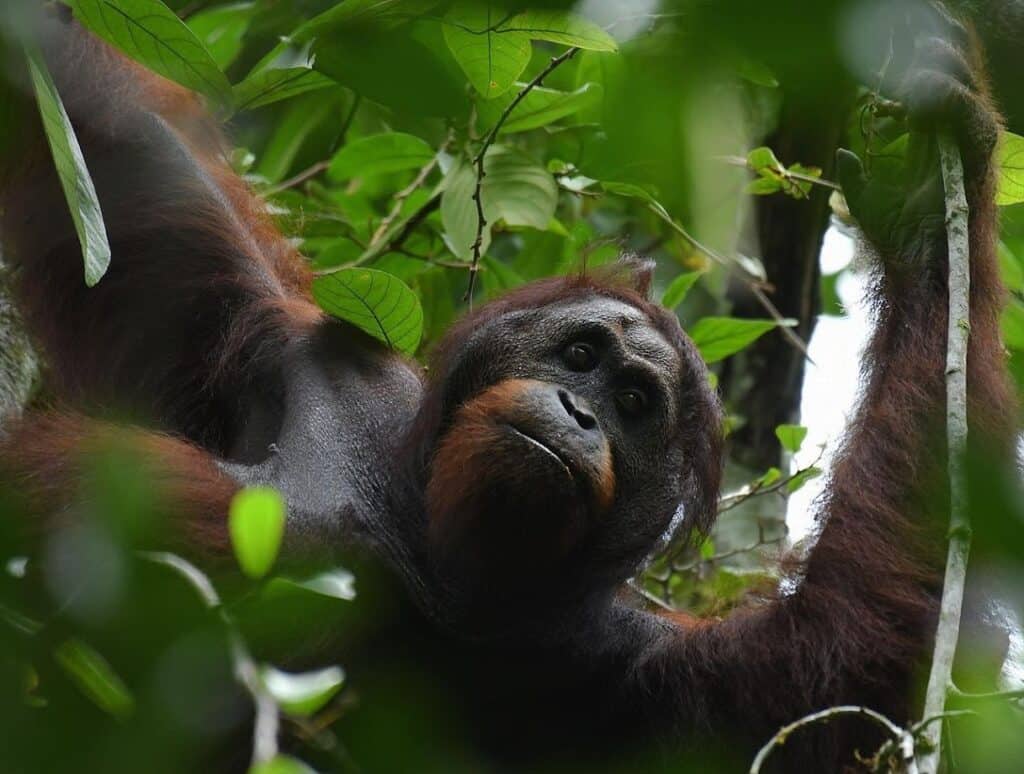
Orangutans live much of their lives high in the jungle canopy. © Sarah Friedlander
Later on the tour, they had another unexpected wildlife encounter. “Heidi has an uncanny ability to attract the most poisonous snakes in the world,” teased Josh, “If there’s a poisonous snake in the world, boom!”
“I’m manifesting it,” joked Heidi.
Atteh rolled his eyes at the unlikely chance of seeing a venomous snake. But later, after the family spent an evening watching flying squirrels glide across the canopy, Atteh let out an excited gasp. He had spotted an equatorial (Sumatran) spitting cobra, a rare and shy animal native to Borneo that he hadn’t seen in 15 years. The experience quickly turned him into a believer in Heidi’s supposed power.
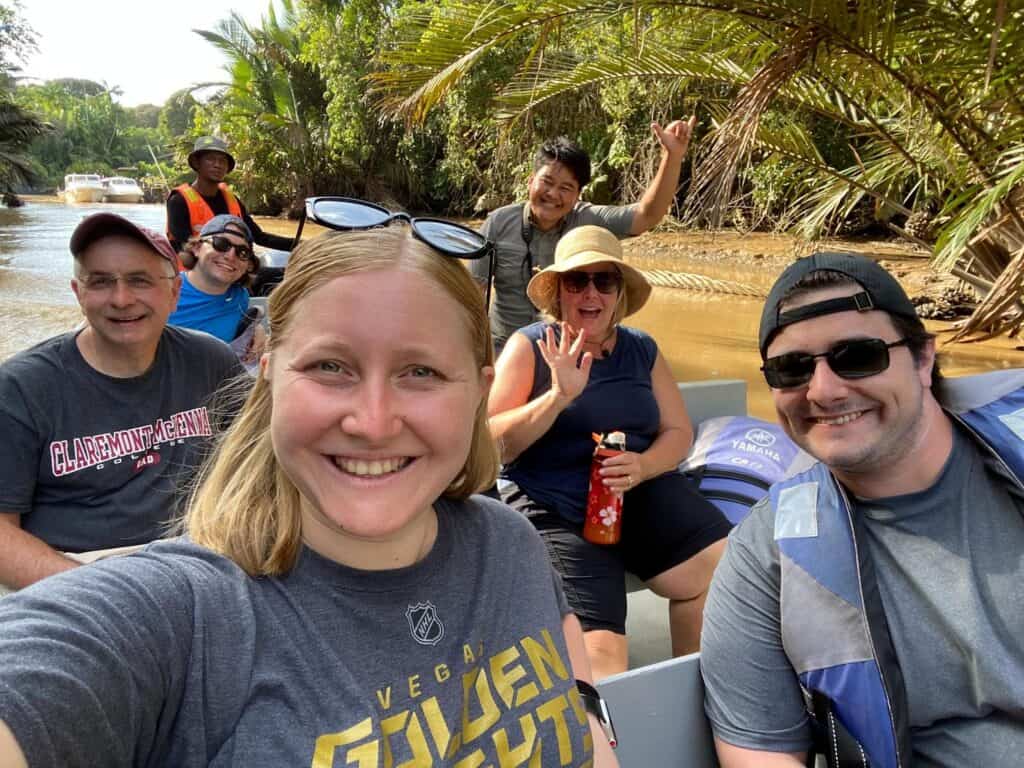
The Friedlander family quickly made friends with Borneo naturalist Atteh (far back right). © Sarah Friedlander
They bonded closely with Atteh. “Our tour guides are our family… Atteh calls Heidi mom!” said Josh. While traveling, they met Atteh’s cousin, Ali, who also worked as a guide, as well as both of their partners, who also work in the tourism industry. Atteh and Ali hadn’t seen each other for a long time due to COVID quarantines, and the Friedlanders were swept up in a reunion with plenty of celebratory dinners and even an impromptu music session.
The Friedlanders were also grateful for their own private family time. Sarah recalled a special moment when Zach, who was engaged in planning a wedding at the time, sat her and Andrew down for a talk.
“He made it a point in that special setting to ask us to be part of his wedding,” said Sarah.
During their adventure, they also searched for pygmy elephants and cloud leopards by boat on the Kinabatangan River. They finished their trip at Sipadan Island, which is famous for its marine biodiversity – especially for its abundant population of green and hawksbill sea turtles.
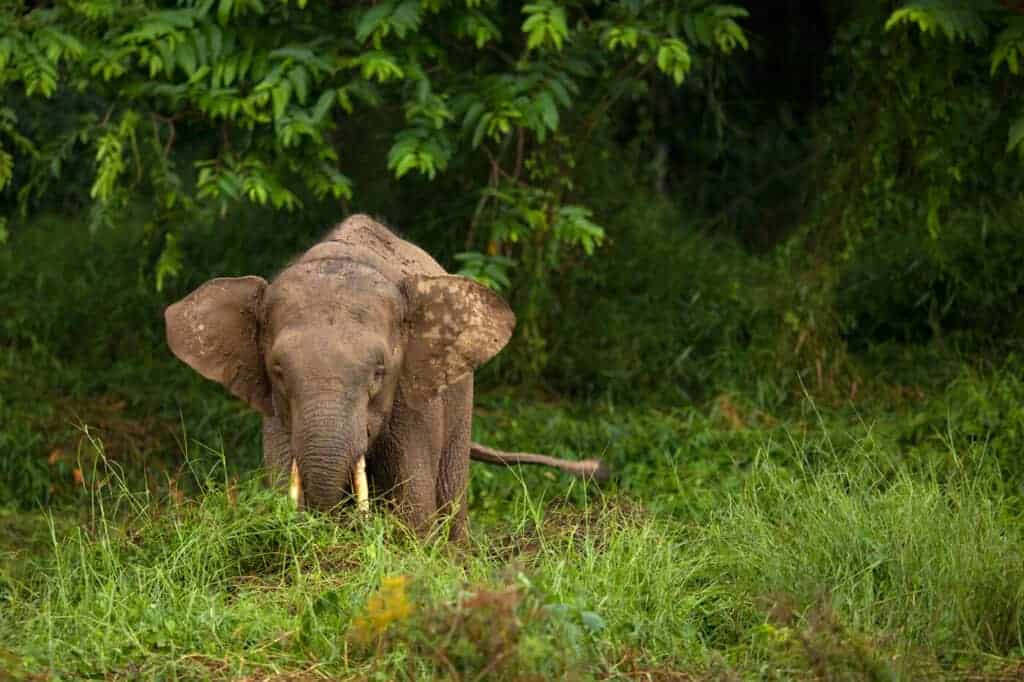
Pygmy elephants can sometimes be seen on the banks of the Kinabatangan River. © Charles Ryan
Hawksbill sea turtles play a vital role in coral reef ecosystems by eating sponges, which have few predators and can overgrow coral reefs. This is one reason Sipadan’s coral reefs seemed “like a Disney movie” to the Friedlanders, where over 3,000 different species of fish and hundreds of coral species live.
At one point, Zach and Andrew spotted an octopus and quickly called the rest of the family over. They all watched together in awe as the octopus changed the color and pattern of its skin to camouflage.
“That was something we will never forget,” reflected Heidi, “Being together in the water… really taking a moment to kind of look at each other and say: ‘This is living, right?’”
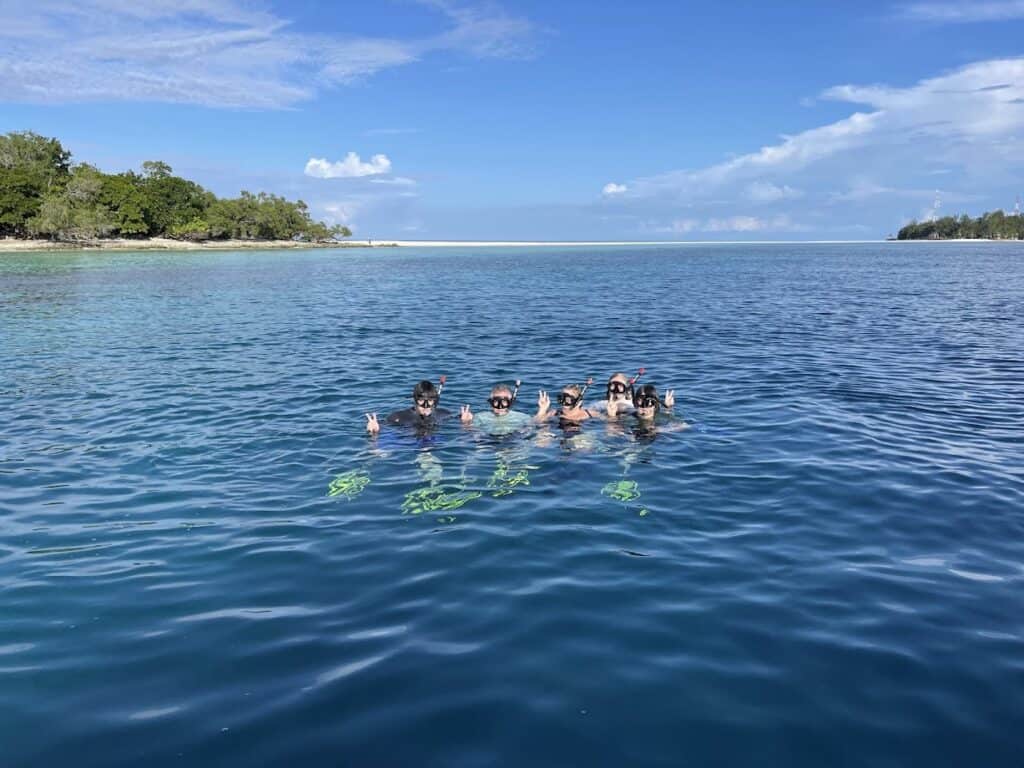
The Friedlanders snorkel near Sipadan, an island off of Malaysian Borneo renowned for its thriving coral reefs. © Sarah Friedlander
Today, they joke that the octopus is their family mascot. That moment is something they will always look back on. “This is a common experience, a common memory that we will carry with us always, because it was so unexpected, and it was such a joyful interaction with nature,” said Heidi.
The Lasting Impact of Ecotourism
While the natural wonders of Borneo left the Friedlanders in awe, it also instilled in them a sense of responsibility to protect fragile ecosystems throughout the world.
“It gave us a mindset of both the conservation and the impact,” explained Sarah, reflecting on their trip that took them to an orangutan sanctuary, a sun bear conservation center, and a local organization protecting sea turtles.
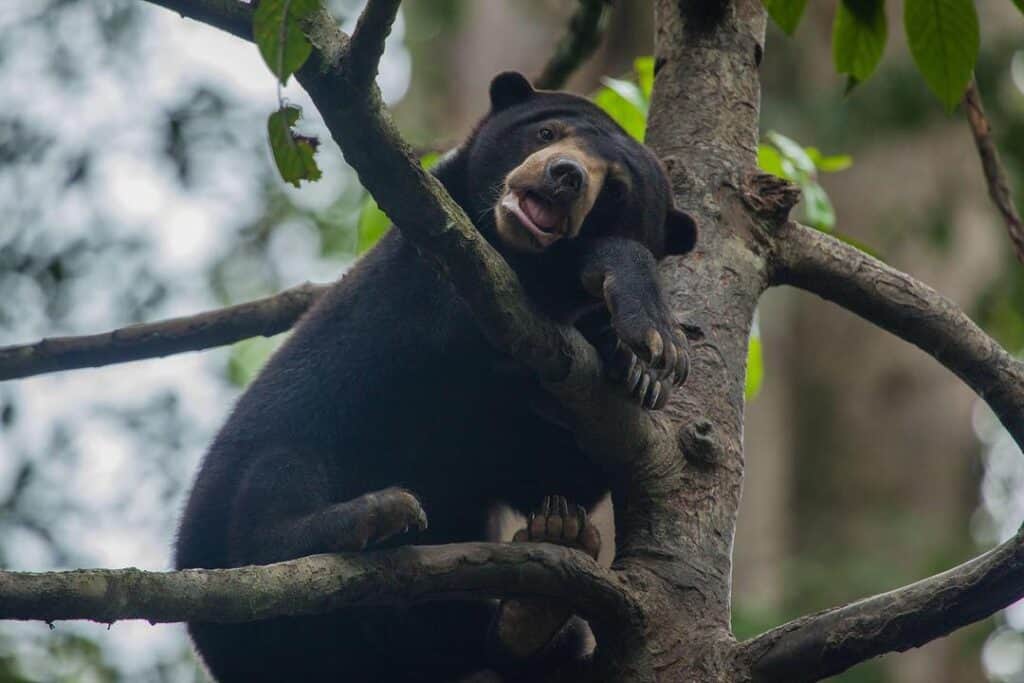
Sun bears are one of the many species threatened by deforestation driven by the palm oil industry. © Charles Ryan
While driving across the country, they also witnessed how palm oil plantations encroach and destroy forests that are critical for vulnerable species like sun bears and orangutans. “It gave us a different sense of how we are impacting our world,” reflected Josh.
Palm oil is the top export for Borneo, and the industry creates jobs for many people. Yet, the same forests that are destroyed also hold significant ecotourism potential. Tourism, when implemented ethically and sustainably, can help communities derive revenue from nature without destroying it – a central principle of Oceanic Society’s travel model.
“Many of us who go on private tours have the financial means to impact society in greater ways. And understanding the work of Oceanic Society allows us to channel our gifts, our impact, in a way that can make a difference,” said Josh.
And Sarah, who teaches in South Korea, hopes to spread the lessons she’s learned in Borneo about safeguarding the planet: “I take all those videos and pictures and information that I learn and bring it back to my classroom,” she said, “I’ll try to inspire the next generation.”

